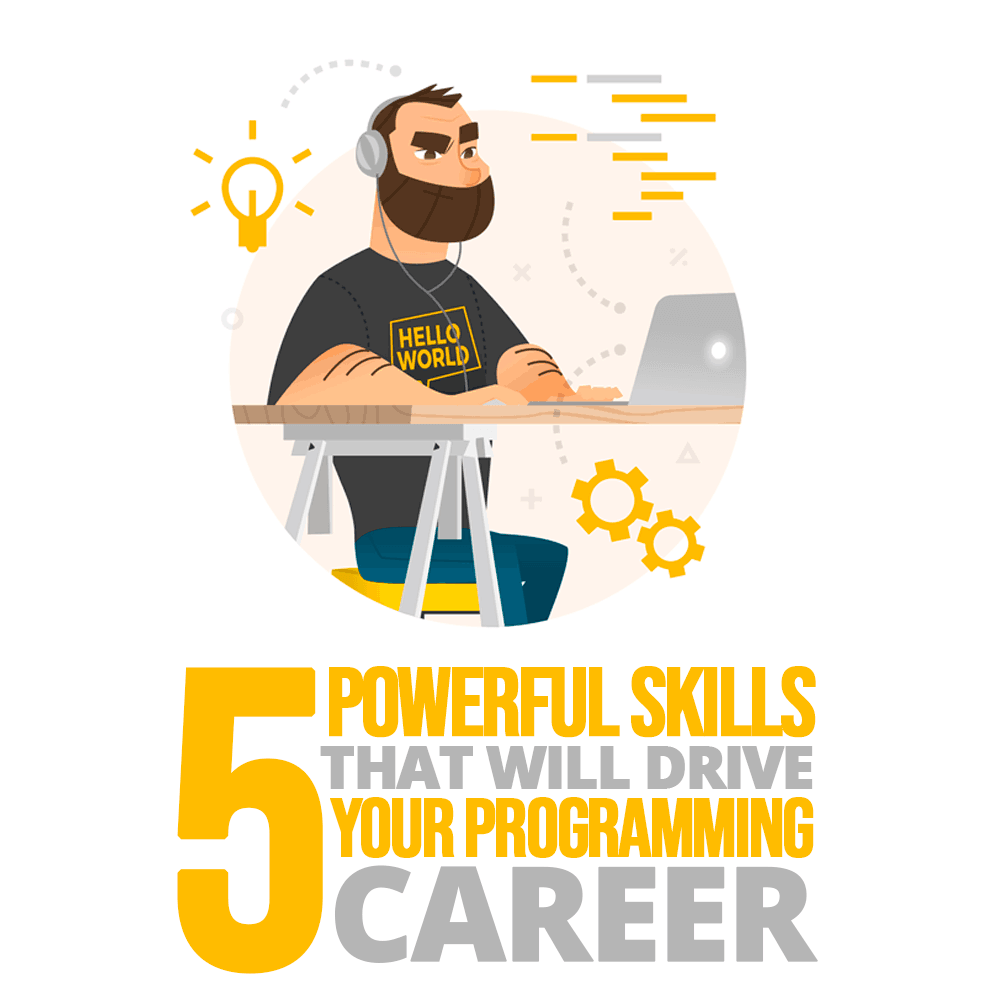
So you’ve been programming for a while and you’re not sure what to do next to build your portfolio.
Maybe you’re new on the scene, looking to stand out as a programmer.
As you gain experience in any career, you run through a learning curve of highs and lows.
When you first start out, everything is exciting. You run into new challenges every day and are enthusiastic about tackling them.
Then, after a few months or years, you start to plateau in your role. You still enjoy it, but you’re ready to learn some new skills that will help move you forward to a new stage.
You may start to miss the challenge of learning new skills. However, you’re not sure what to do next.
If that’s where you are now, then this article will help you reframe some of the skills you already have to move you forward. You will learn new techniques and strategies to help you progress with your career.
Let’s talk about five skills that can help take your portfolio to the next level.
Today, I’m going to cover one technical skill and four soft skills that will help you advance in your career.
First, let’s get technical.
Integrating Data Science and Analysis
Data science is big business these days.
While we still see a significant gap between the number of programmers available and the number of programmers required, more people are coming into the profession. And with so many newcomers to the industry, it’s crucial that you stand out.
With the increasing pool of pure data scientists and wages for data scientists beginning to see some decline, those who can work across business and tech are the ones who can take advantage.
For example, if you are a freelance app developer, many clients wish to incorporate a data science element into the app.
You may add a tracking element to your app that shares reports with the client on customer behavior. This data can be used to increase conversions through the app. For the client, this is a benefit, as it will enable them to make more money.
The reason for this is that many apps make money through surfacing advertisements. If you can surface ads that get more clicks, the client can make more money from the app.
Setting up a simple data analysis and machine-learning system within the backend of the app—targeting ads based on users’ interactions—can really add value to the client. You don’t need Google DeepMind-level artificial intelligence to create something useful.
How Programmers Can Get Started in Data Science
Three areas will allow you to get started in data science from a technical perspective:
- Database setup and management (essentially backend development) – You will need to understand how to structure high-quality data in the backend so that it can be captured and analyzed effectively.
- Pulling data and analyzing results – Commonly, this is done using Structured Query Language (SQL). You can use this to better understand how the app works for customers.
- Machine learning – Once you have useful data, you can use Python and its associated libraries to run machine learning algorithms on it. This is useful when trying to predict the future behavior of users.
All of these skills can be learned through online courses, or an old faithful, YouTube.

However, if you’re new to the world of data science or looking to get ahead in your programming career, you may not want to rely solely on your technical skills.
While it is clearly essential to have a robust technical profile, as with any other industry, soft skills can really help you stand out.
So, if you’re looking to set yourself apart and really drive your career, here are four soft skills that can really help you.
Effective Project Management
Project management and organizational skills are beneficial for programmers.
You can use these skills to coordinate both with the many stakeholders you might have and with your project team. This will help you not only deliver the project faster, but also manage expectations effectively.
Many people within a business find concepts related to software development challenging to grasp. These people may not understand the processes involved in completing a project.
You can support them by providing clear plans and milestones within the development that will help them to understand the process.
As a programmer, three of the skills within project management I recommend developing are:
- Stakeholder mapping – Being able to identify the key stakeholders and their role in your project’s success. With this knowledge, you can then plan engagement with these stakeholders.
- Milestone planning – Scheduling project deliverables and sharing them with stakeholders.
- Progress reporting – Sharing updates concisely and effectively, allowing the team to understand the development status.
Closely linked with the project management skills outlined above is a set of skills that is fundamental whether working on a team, or programming solo for a client. And that is communication skills.
Brilliant Communication Skills
Communication is key for helping you deliver a product effectively to a client.
A major part of communication is being able to connect with people and understand their emotional reactions to a topic.
One often underestimated competency is emotional intelligence (EQ).
EQ is at risk of becoming another one of those buzzwords associated with life in the corporate world.
But you shouldn’t let it.
Having emotional intelligence, and understanding your clients’ emotional reactions to a product, will help you understand how to communicate with them.
As discussed in this Simple Programmer article, being emotionally intelligent is a powerful skill for anyone, including programmers, looking to do well in a job. The ability to understand others and respond in an intelligent way to their needs is an important skill.
There are many different ways you can work on your communication skills.
One very effective technique is to ask for feedback on your communication skills from the people you work with. Sit down with them and have an up-front conversation about where they feel you are strong and weak when it comes to communication.
I know it can feel intimidating, but if you approach this exercise with the right mindset, as a learning opportunity, you really can get a much better picture of potential development areas.
Once you have the areas you want to work on clear in your mind, you can then work with your manager to implement them.
If that all feels like a bit much, then you can learn a lot about communication skills from books.
There are plenty to choose from. However, in my experience, one of the most useful books I have used to improve my communication skills is Getting to Yes: Negotiating Agreement Without Giving In.
I know what you’re thinking: “I’m a programmer, I’m not in sales. Why should I read a business book on negotiation?”
Let me immediately disrupt that thought process for you.
Whether you choose to believe it or not, (almost) every piece of communication you do is a negotiation.

Be that negotiating with your colleagues about the best library to use to run your program from, through to which film to watch with your friends on Friday night.
If there is more than one opinion or option involved, it’s a negotiation.
What the book Getting to Yes does so well is help you to put yourself in the other person’s shoes.
The authors teach you how to understand where a person is coming from more effectively and, therefore, how to communicate your ideas to them. This in turn facilitates an effective relationship.
As you look to develop your programming career, the way you react to and manage different situations will be critical to your development.
As they say, you catch more flies with honey!
Leveraging Your Prior Experiences
As programmers, we are always learning and developing our skills. But it’s worth remembering that not all skills and experiences are technical.
In this world that you live in, there is a lot to be learned. It is a world you understand to a certain extent and of which you have much experience.
Your experiences are an incredible pool of data that you can pull from, to kick-start or level up your career in programming. Appreciating the value of your previous experiences will help you develop a unique personal brand as a programmer.
The previous experiences, or training data if you will, are what got you to this point. This data can also drive you forward and bring unique insight to your current endeavors.
Nobody knows you as well as you do; you can use that knowledge.
Reflecting on your prior experiences and what you have learned from them is a useful exercise for anyone to complete. Through reflection, you can internalize what you have learned and make it knowledge.
Most of us are familiar with how previous technical experience can be helpful in a new project.
For example, imagine you are working on a product that has an augmented reality element.
If this is something you have worked on previously and you identified a challenge with rendering on certain mobile phones with Android, this is knowledge you can share with the client. The knowledge you have will help them understand different options for the new app.
Another example of leveraging previous experience comes from parenting.
As a parent, you are used to having to balance multiple competing priorities. You often have to make difficult choices about how time is spent and negotiate with difficult customers (your children).
You can use the proven skills and systems you have developed through parenting, then apply them to your programming work. You would be surprised how similar teams of marketeers are to groups of children!
Implement the systems that work and make you more efficient across all areas of life.
Knowledge is power.
Excelling at Cooperation and Teamwork
In line with understanding the value of your own unique background, it’s also essential to see the benefits others bring.
Seeing the value others bring to the table as team players will help you drive your career and the career of others. After all, technology and development are all about cooperation.
Whatever type of project is being done, if you’re stuck, you’ll want to be able to work out a solution. However, often working out a solution requires many heads.
When working on a problem that could block development, knowing you have the support of a team is truly valuable.
Maybe the system is doing something weird you don’t understand. Perhaps the algorithm you developed using your new data science skills (:D) needs updating to manage the processing power required.
Or maybe there’s an error somewhere in the code, and despite staring at it for the last three hours, you just can’t spot it!
Programmers work on teams. On teams, it is crucial that you are all able to contribute effectively.
In all these scenarios, the ability to cooperate and work with others to solve problems will help your programming career.
Balancing Technical and Soft Skills in Your Programming Career

So there you have it, five transferable skills that will kick-start your programming career. By balancing your strong technical portfolio with some solid soft skills, you will be in a great position to catapult yourself to the next level.
To summarize, you can use:
- Data science skills to stand out to clients
- Project management to stay on top of everything
- Communication to ensure everyone is aligned
- Prior experiences to bring your own unique take on a project
- Teamwork to solve problems more effectively
Technical understanding is fundamental. But to stand out from the pack, you need to draw from all your unique training data.
You already have the tools in your kit to implement the five strategies we have discussed. With a little refinement and polishing, you will shine like a diamond!
